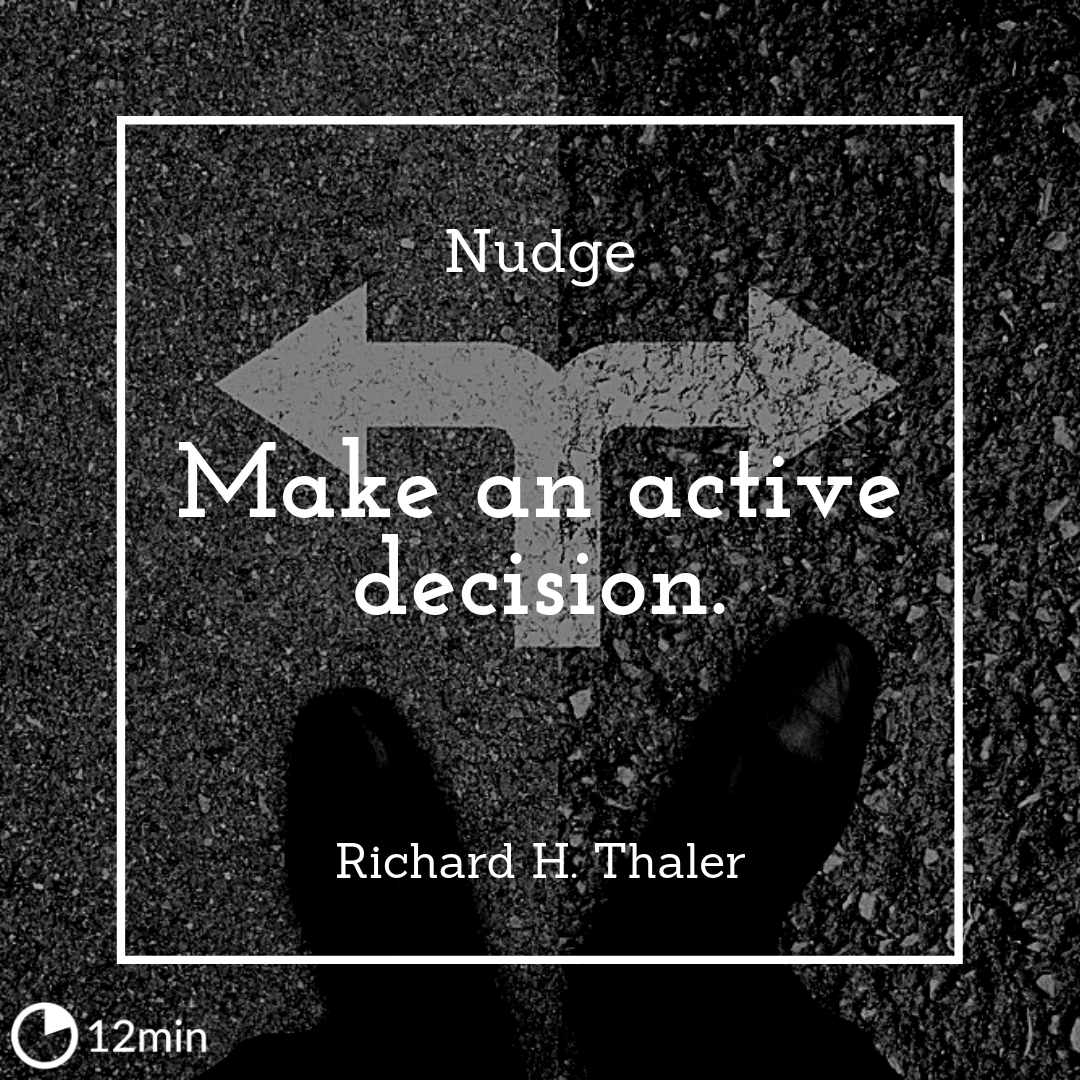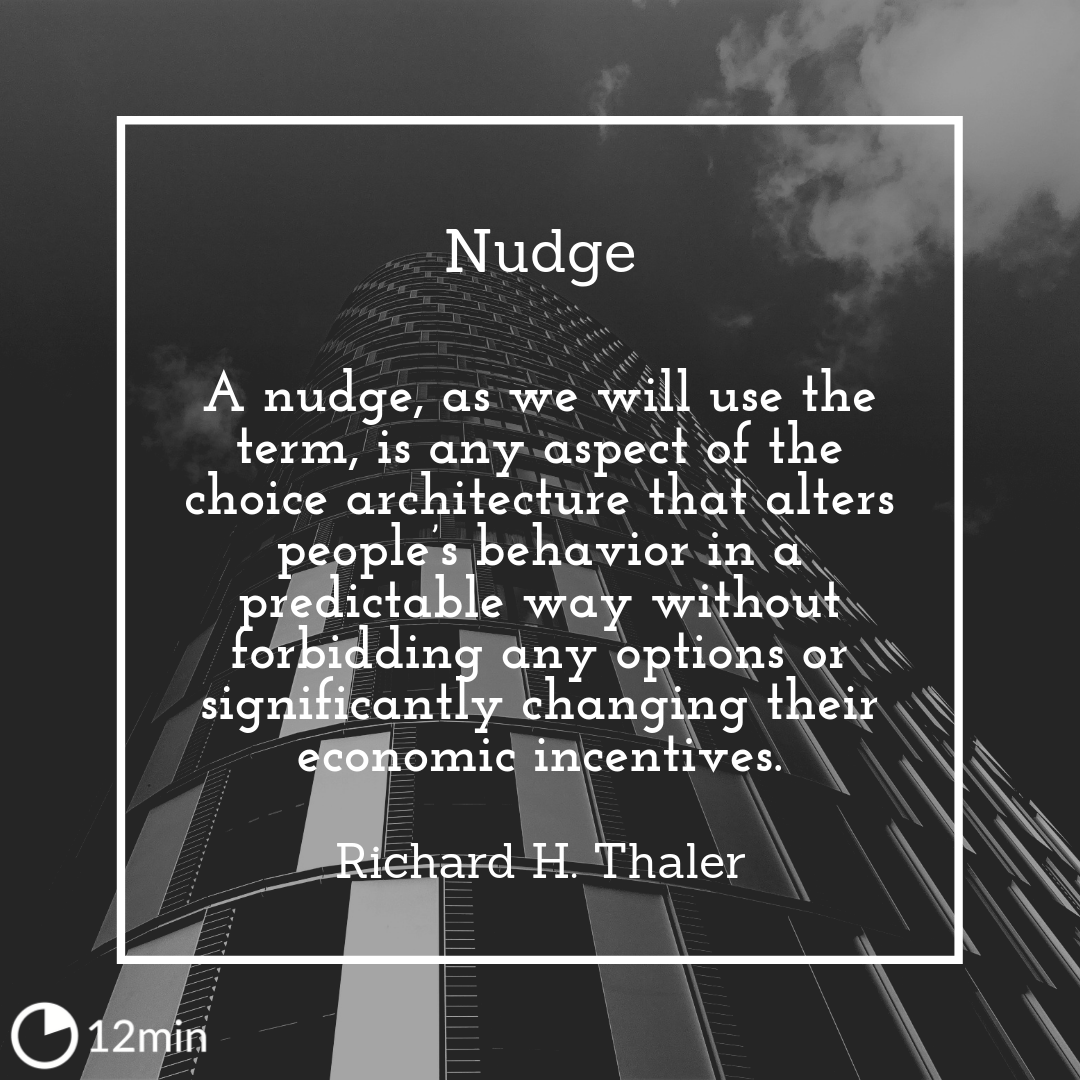Nudge Summary

5 min read ⌚
Improving Decisions About Health, Wealth and Happiness
MicroSummary: We make decisions all the time, big and small. What to have for breakfast, what to wear, whether to buy a new TV or car, whether to change careers or commit to someone for life.
Unfortunately, as Richard Thaler and Cass Sunstein argue in Nudge, we often choose poorly.
This is because we’re never presented with a truly neutral choice. We’re biased, and that affects our decision-making.
DECISIONS / NUDGE
“Often we can do more to facilitate good behavior by removing some small obstacle than by trying to shove people in a certain direction.”
Who Should Read “Nudge”? And Why?
To raise the bar, you must become sturdy enough and be a person with expertise on various topics. Assumingly, such individual doesn’t exist, so we must gamble on other people’s skillfulness and craft.
With this intro, you can already guess that “Nudge” is accessible and acceptable to any person. It’s is designed in a way to expand your mindset beyond the self-created boundaries and opens your eyes to the possibility that you have a choice in everything you intend to accomplish or avoid.
About Richard H. Thaler & Cass R. Sunstein
 Richard H. Thaler is renowned American economist and expert in behavioral science born on September 12th, 1945. In 2017 he even became a Nobel Prize Winner, due to his immense contribution to the realm of behavioral economics.
Richard H. Thaler is renowned American economist and expert in behavioral science born on September 12th, 1945. In 2017 he even became a Nobel Prize Winner, due to his immense contribution to the realm of behavioral economics.
 Cass R. Sunstein was born on September 21st, 1954 in Concord, Massachusetts. He is best described as a scholar with certain expertise in administrative, environmental, and constitutional law.
Cass R. Sunstein was born on September 21st, 1954 in Concord, Massachusetts. He is best described as a scholar with certain expertise in administrative, environmental, and constitutional law.
“Nudge Summary”
Thaler, Professor of Behavioral Science and Economics at the University of Chicago, and Sunstein, a Harvard Law professor and expert in behavioral economics, draw on their significant expertise to show us how people think, and how they can be nudged onto the right path without restricting their freedom of choice.
People must integrate their choices, to be aligned with the vision. To cut a long story short, regardless of the seriousness of the situation, each passing second, we turn and make our move. You cannot avoid the decision-making even if you sit still all day long.
Whatsoever you set in motion, an emotional response is natural to come afterward. Such automatic system sometimes serves as a defense mechanism but more often is unfolding unconsciously.
Whether your action or reaction is a sign of habitual outburst, or you intentionally conduct such in-depth analysis of the situation, no one knows except you.
Thaler and Sunstein list 5 biases that affect our decision-making:
- Anchoring: relying too heavily on one piece of information and making (usually) false assumptions because of it.
- Availability heuristic: overstating risk, or predicting the frequency of an event based on the number of examples of it (for example, thinking that murders are more common than suicides because we hear more about the former).
- Representativeness heuristic: seeing patterns in random information.
- Status quo bias: doing something that has traditionally been done even though it may not be the best thing for you personally. We have a tendency to resist change unless the benefits are clear.
- Herd mentality: we’re heavily influenced by others, and peer pressure can be a major factor in the choices we make.
Once you understand how your different biases work, you can control them. You’ll be able to make better choices and improve your health, wealth and happiness, and help others do the same.

“Social influences” must not be discredited by any community, because its impact on us is powerful to create thousands if not millions disparate inner world. Sometimes the external factors tend to delude the people into supporting “legal bodies” or illegal that act against them.
The strongest tool at your disposal is to earn the trust of your fellow associates.
According to various statistics, we as humans are imitators, which led us to a conclusion – if you witness that your co-workers are doing something, you are probably going to follow the same direction.
It’s needless to say that most of the people rely on outside help for improving their decision-making potential. If the stakes are high, they’ll turn towards their trusted family members or if the issue concerns the organization, they’ll discuss it on a professional level. In any case, it’s to understand that the bigger the risk, the greater the aid.
For instance, if you intend to purchase a beautiful, warm and secluded house, you are going to need assistance from more experienced subjects on the topic.
It’s rarely a choice when you can afford too much freedom. According to many, this is not logical, but remember, even having all the options you can possibly get in a free, accessible market, a temporary struggle is unavoidable
Making bad decisions is slowly becoming a profession. Today’s world doesn’t pardon any deliberate mistake or unintentional miscalculation. To protect your interest, you must broaden your horizons, and allow others to assist you in gaining that edge.
Key Lessons from “Nudge”
1. Social Issues and the power of nudge
2. Thrive on challenges and handle the responsibility of a leader
3. Educate the People about Money-Saving
Social Issues and the power of nudge
How to solve same-sex marriage tensions? – The best way to do it is by creating an open-minded community. Only such force can deal with the increasing pressure, and reduce the state’s influence in this matter.

Thrive on challenges and handle the responsibility of a leader
Being socially responsible is a tough task in today’s profit-oriented environment. Many factors pose a threat to the newly established collective awareness.
In order to save our way of life, we must examine and explain the links between the citizens and corporations.
Educate the People about Money-Saving
A large portion of the population, regardless of the status, and living-condition is not well educated when it comes to managing finances. Your job as an expert should include: providing financial advice and nudge people into making better decisions.
They should also be familiar with common capital risks and frauds.
Like this summary? We’d Like to invite you to download our free 12 min app, for more amazing summaries and audiobooks.








